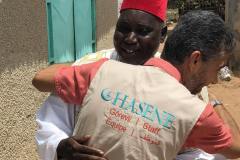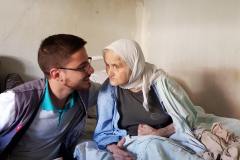WHY ZAKAT FITRA CAMPAIGN?
Zakat is one of the five pillars of Islam. Moreover, it is a Zakat al-mal and Zakat al-fitr are two forms of zakat that Muslims are obligated for It is mandatory for every adult Muslim who has the necessary financial means. Those who benefit from the taxes collected in a fund are explained in Surat Tawba, verse 60: “The Zakat (alms-tax) is only for the poor and needy and those who strive for administration (the Zakat), and those who whose hearts are to be won, and for the prisoners and the debtors and the cause of Allah and the traveler. (This is) a rule from Allah. Allah is Knowing and Wise. “
” AND ESTABLISH PRAYER AND GIVE ZAKAT, AND WHATEVER GOOD YOU PUT FORWARD FOR YOURSELVES – YOU WILL FIND IT WITH ALLAH; SURELY ALLAH SEES WHAT YOU DO. “
—THE HOLY QUR’AN, 2:110
Zakat al-mal is calculated and paid every year as a percentage of 2.5% on their surplus wealth. This includes cash, stocks, investment property, gold or silver any other assets that individuals may have.
The Zakat al-Fitr (Fitra) is a special form of Zakat. It is paid at the end of Ramadan, but does not replace the annual payment of zakat.
With the income from our Zakat and Fitra campaign, Hasene help needy people and refugees. At the same time, we promote the religious and cultural education of Muslim children around the world. We carry out educational projects and award scholarships to financially weak students and pupils.
FREQUENTLY ASKED QUESTIONS
Zakat and Fitra Campaign
Select the category “Zakat and Fitra” on our website under the heading “DONATE NOW”. Please choose the appropriate form of submission and indicate the amount to be paid. Please go to “continue” and fill in the requested information so that the payment can be successfully completed.You can hand in your Zakat, Fitra or Sadaka in your nearest Hasene office. Please put the corresponding amount in the designated HASENE Zakat and Fitra donation envelope.
You can also do Bank Transfer to the TD Bank or etransfer to [email protected] ensuring that you are stating the type of donation (Zakat, Fitra or Sadaka).
In Arabic, zakat means purification, growth and blessing. It is a charitable practice that requires all able Muslims (those who meet the requirement of zakat as dependent upon nisab and hawl) to contribute a fixed portion of their wealth – 2.5% of savings — to help the needy. The zakat corresponds to 2.5% of the total assets remaining at the end of a year after deducting all necessary living expenses. In addition to cash, assets subject to payment are real estate, property such as jewelry and precious metals and livestock. The so-called Nisâb limit is determined for each of these values. If the assets remain below this limit, they are not taxed.
A person covered his/her basic needs. After one year, she/he owns $3,800 in cash, 50 g of gold (jewelry) and $1,250 in the savings or home savings account. However, it also has a debt of $6,000, of which $1,200 must be repaid in the current year. The amount of gold (50 g) does not reach the Nisab limit. The rest of the property, however, is subject to zakat. The result is 50 g x $34.82 = $1 741. Accordingly: $3,800 + $1,741 + $1,250 = $6,791. The amount for school repayment will be deducted from this amount. This leaves $5,591. Of this, 2.5% are payable for the Zakat. This results in $5 591 x 0.025 = $139.78.








